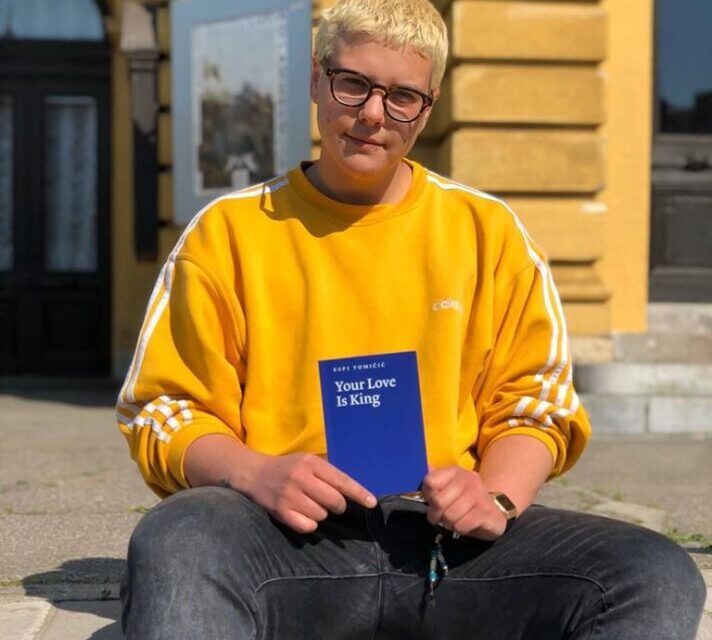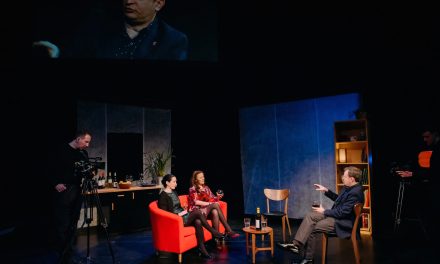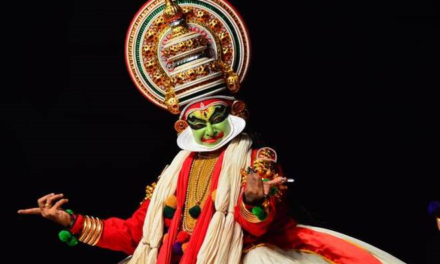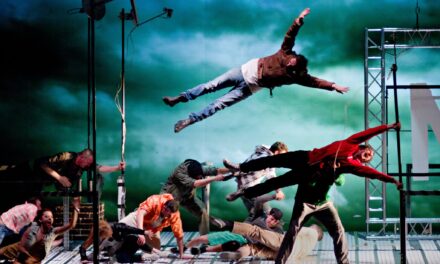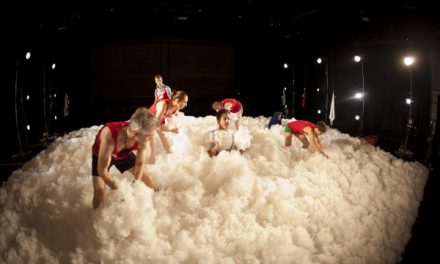We continue our conversation with Espi Tomičić, a Croatian playwright and “boy from the neighborhood.” While we closely examined his two plays in the previous part of the interview, here we talk about broader theatrical topics and read excerpts from his play, Your Love is King.
Jelena Gvozden: It has become a rule – any play that you write must receive an award. But you don’t put much weight on awards; you describe them as only short-term material security and opportunity for better visibility for the piece. However, is there a prize that would be an honor for you to get?
Espi Tomičić: It’s not about the awards themselves, but about the people in the jury, who are changeable. The Dean’s award and Drame.hr award are achievements that make me happy because those awards are from people whose work I admire and value. Like every young author, of course, I hoped for the Držić Award when I began writing plays because it is recognized at professional and state levels. It brought me a large sum of money, which helped me pay rent during the pandemic lockdown. I wouldn’t say that I don’t give a great deal about rewards. It’s rather about a tendency in community to glorify someone’s work just because it’s award-winning, but we forget that it’s a subjective decision made by a few people on the jury. In fact, all that hype about a prominent individual is getting on my nerves. It is similar to mingling and pub crawling – the more you mingle, the more opportunities for work you’ll have. The more awards you receive, the more chances and projects you’ll get. There are so many people whose work is not recognized nor given space, only because they don’t like to hang out in pubs or some persona (whomever they are) didn’t choose them and make them “someone.” I always hated these kinds of groups in school, but here I am now, in an absolute paradox. People start addressing you differently, they start saluting you and it makes me sick. I don’t want to be part of the “we eat raw food for 5K and hustle art” club. I just want to continue drinking on benches in public parks and wear a gold chain around my neck, with my friends.
JG: With awards, publicity grows. Does that put pressure on you?
ET: Sure thing, expectations are rising and readers become more critical. The biggest pressure is the media portrayal of me as a writer. It is funny because often when I’m online, or when I’m drinking around or when there are no customers at my work at a pizzeria, I come across interviews or reviews of my pieces. I can’t connect myself with that person in the review or interview, as if it is someone else, who annoys me a little because he continues to let the cat out of the bag. Dunno how exactly to describe it. I constantly have requests for interviews and public appearances but I can’t make them because I’m busy dealing with pizzas, burgers, and life. I was contemplating how others achieve all: exposing themselves in media, working, writing, living, and having fun. It seems impossible, and I would never replace beer on the stairway of the Croatian National Theatre with that life. I try to spend the little time I have with friends, my dogs, and my girlfriend.
Excerpt from the play Your Love is King:
I imagine how it is eating you from the inside
how your organs are falling apart
how I hugged you as a child
and how your skin was soft
I made that up
you’ve been smoking for forty years
your skin has never been soft
I don’t remember the last time I hugged you
but I imagine your body falling apart
and I’m sweating
I’m scared
JG: What are your insights into the human need for art, and its place in our lives during major crises?
ET: Frankly, I would not generalize nor talk about a specific moment. In my opinion, art occupies a large space in the life of every person, whether one is aware of it or not. I could say everything that needs to be said to answer questions like this: the importance of art, politics, and history, but art is omnipresent. Eventually, we can discuss whether art is really art at all if the recipient does not understand it as such or is not aware of it. Art is not just a moment of raising the curtains, or a long shot in some European artistic film. Let’s not forget everything that surrounds us – new technologies, pop culture – art is in everything. Everything depends on the recipient, what one considers as art. I approach folk music and poetry equally and analytically.
JG: You describe your writing as an act of inspiration, followed by the arrangement of the text. What would you label as the alpha and omega of creation, and which moment do you consider the most important in the creative process?
ET: For me, the most important moment is having free time to turn my laptop on. The situations are already in my head before I start writing. The characters, who I see and talk to in everyday life, become developed in my mind, and then I write them down. I always start from injustice or something that bothers me, then I put together pictures, situations, and characters in my head. I mark the ending by wrapping up the topic. Usually, people who read my work during the development process say, “this is for a new text, here is the finish line, that is a surplus,” etc.
JG: Did you use writing as a battlefield for your internal struggles before writing these award-winning plays? If so, what forms were created then, and do you intend to publish some of them?
ET: In fact, I didn’t. I wrote poetry and a diary, but nothing of high quality and worth reading. I keep them so I can see what preoccupied the younger me and what subjects I dealt with. These three plays are the only plays I’ve written for now, the first one in 2018 and then two more. I have also written some screenplays, but they are unlikely to be realized because we are most interested in director-as-an-author films, and screenwriters are rare. I don’t want to go deeper into that issue, but yes, I am interested in screenwriting and I enjoy creating scripts.
grandma had died from bowel cancer
silence
bowel cancer?
yes
you said yes
but you wanted to say
grandma had had cancer
and we lied to you that it was from an appendix that had ruptured
for you not to worry and not to think about it
I said nothing
your grandma had died of cancer
it echoed in my head
I remembered every rounded no
every consent in the transition process
every form
no one of mine has ever had cancer
and that’s why I’m kicking myself with testosterone
and that’s why I’m confident at a psychologist when she tells me
it’s often an inherited disease
and you don’t have it in your family
JG: What do you like about theatre, and what would you like to achieve in it? What advice was useful at the beginning of your career that you could share with someone who is just starting out?
ET: Collective work is certainly something that attracts me to theatre and film. Every person in the process brings something of their own, a piece of the puzzle, and then we build our little world together. But nobody has put me on the repertoire yet, ha-ha, I’m just kidding. I’m still at the beginning of my career, so I’m currently getting advice, but I think one marked me – Ivana Sajko told me in a workshop, “throw that talent out the window if you don’t want to work” and I always remember that. Patience, patience, patience – I think it is important to understand that even in the beginning, but also to go beyond one’s own framework and egomania. Everything I have learned about writing is from my professors at the Academy of Dramatic Art in Zagreb. Sure, there were times when I didn’t know why they were pushing me into something else in writing or when I was lost, but now I know exactly why they did those things. I know now why it was important to write in classical forms, to deal with the character’s motivation, to make the situation as a starting point, etc. It was important to open up to comments, criticism, and advice. That is the only way to progress and learn.
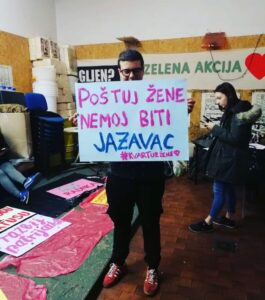
Espi Tomičić holding a sign with a caption “Respect women, don’t be a badger. #NeighborhoodForWomen.” Personal archive.
JG: Most theatre artists perceive theatre as a space for social debate. What is your view on political theatre?
It is both inevitable and very important. Theatre must not accept censorship, obedience, and silencing. The problem with theatre in our country is financing and political power games. Politically questionable texts are often staged, all for the sake of satisfying the rulers and the right-wing. It’s a disaster of theatre for me.
ET: How would you describe the theatre scene in Croatia, and what kind of theatre practices would make you happy?
We’re nailing it! I really think we have great performances and repertoires, but I would be happier if we had a stronger alternative scene. Yet, the KUNST THEATRE has opened up its space for that, and things are slowly changing. I think streets and squats are spaces where more creation should happen because political theatre is more powerful and critical thought is freer there. Furthermore, in-yer-face theatre is something I would like to see more here.
the other day I was horrified by a play of a woman
(an appreciated Italian writer)
who wrote about migrants
from her armchair
at a minimalist home
yet here I am
my own mother has cancer
which is eating her organs
and I’m drinking beer
in another country
another city
and I’m writing about near death
or recovery
JG: How much does reading other writers’ pieces and watching other performances influence you? What would you abstract as the most impressive imprint?
ET: Without watching and reading there is no writing, but I am not that well-read of a person and I haven’t seen a lot of performances. Instead, I dedicate myself to poetry every day, because it is a short form that I can easily complete. I believe there are a lot of things that would affect me or leave some trace, but I’m not in a social class where I have time to read everything in what people consider general culture or what they think I have read for sure – and what about all the books I want to read…? I wouldn’t want to specify our playwrights because I always leave someone out. Young authors in our country are excellent writers and I am always happy to read my colleagues’ work. Besides, their texts reflect my life and the problems of my generation. However, Edouard Louis, Paul Preciado, and Didier Eribon are authors who have intensely influenced me, and in whose works I find thematic similarities with my own.
Jelena Gvozden is in love with the magic of words. She became obsessed with studying comparative literature and learning several languages. Trying to understand others and herself better, she likes to think that knowledge helps her in conversation and interactions with people.
This post was written by the author in their personal capacity.The opinions expressed in this article are the author’s own and do not reflect the view of The Theatre Times, their staff or collaborators.
This post was written by Jelena Gvozden.
The views expressed here belong to the author and do not necessarily reflect our views and opinions.

